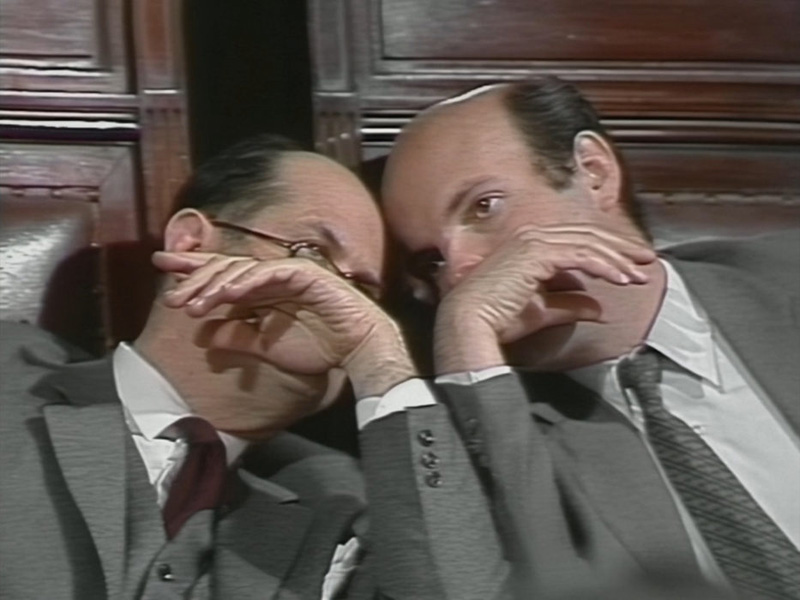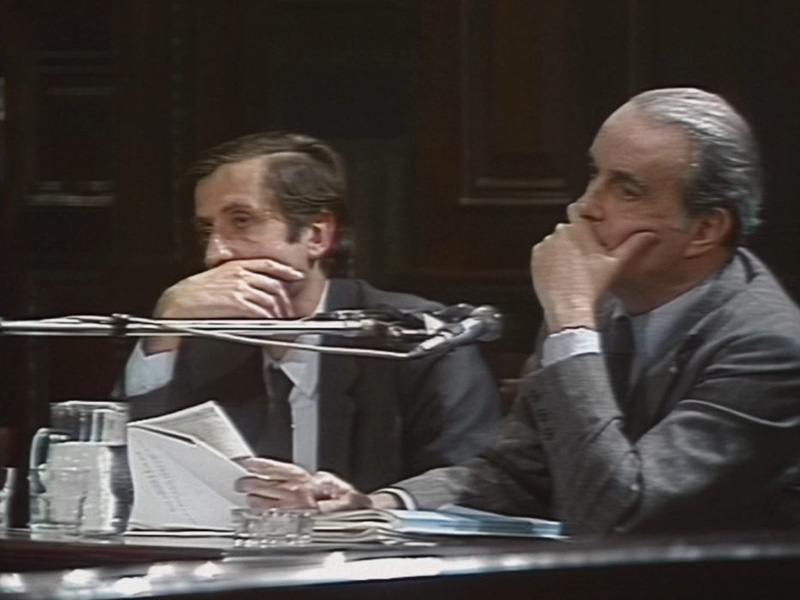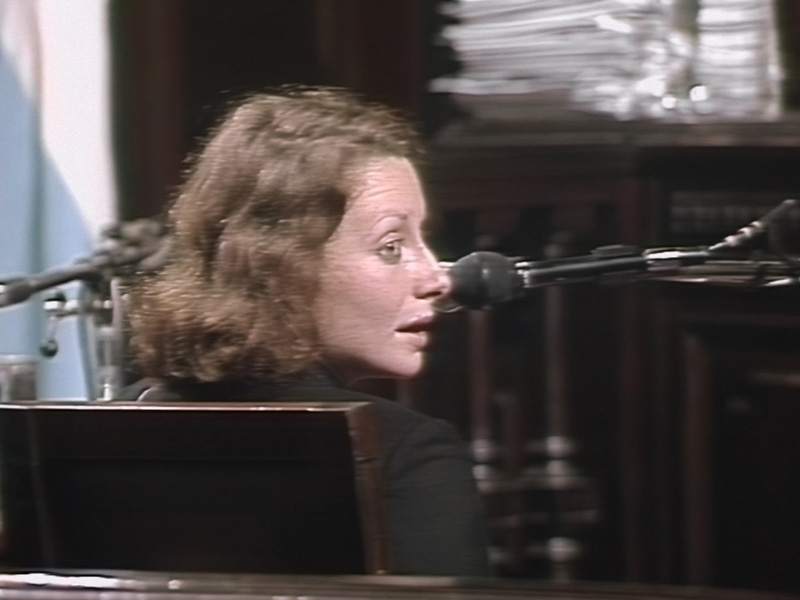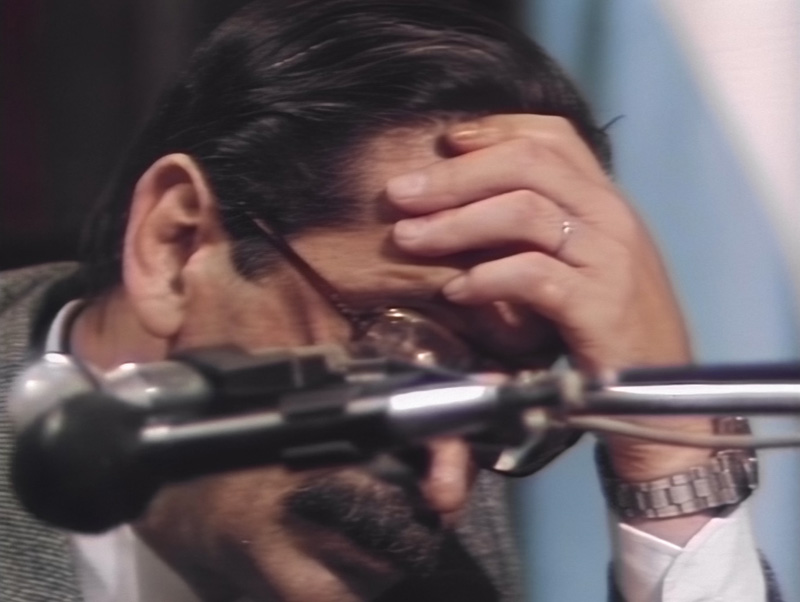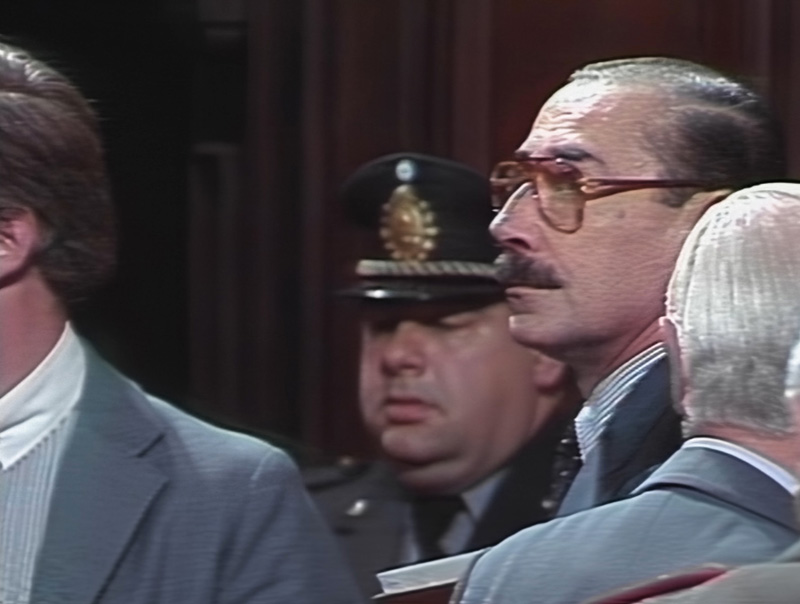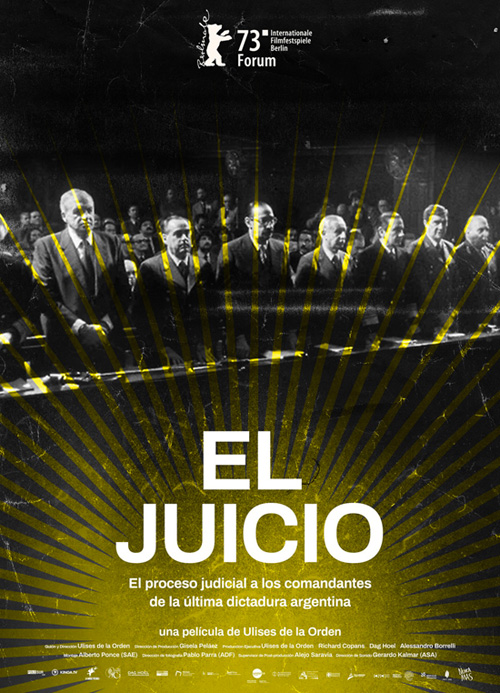Le Procès
-
Réalisé par Ulises de la Orden • Écrit par Ulises de la Orden
-
Argentine, France, Italie, Norvège • 2023 • 177 minutes • Couleur
- Réalisation :
Ulises de la Orden - Écriture :
Ulises de la Orden - Image :
Pablo Parra - Son :
Matthieu Deniau - Montage :
Alberto Ponce - Sound design :
Gerardo Kalmar
- Production (structure) :
Polo Sur Cine - Coproduction :
Dag Hoel Filmproduksjon, Dag Hoel, La Sarraz Pictures, Alessandro Borrelli, Les Films d'Ici, Richard Copans - Ayant droit :
Polo Sur Cine
- N° ISAN :
non renseigné
Résumé
1985. Buenos Aires, Argentine. Le procès des juntes de la dernière dictature (1976-83), accusées de crimes contre l’humanité. Comme à Nuremberg après la Seconde Guerre mondiale, le procès fut entièrement enregistré sur des cassettes U-matic. Les témoignages des horreurs se succèdent pendant 90 jours, avec comme jugement final : plus jamais ça.
"Quarante ans après le retour de la démocratie, Ulises de la Orden et son monteur Alberto Ponce ont condensé, en trois heures et dix-huit chapitres, les cinq cent trente heures d’enregistrement vidéo des audiences du procès de la junte argentine, qui jugea, du 22 avril au 9 décembre 1985, neuf des principaux responsables de la dictature militaire. Ces bandes, conservées au parlement norvégien depuis 1988 afin d’en assurer la sécurité, n’avaient qu’en partie été rendues publiques, la plupart ayant fait l’objet à l’époque de résumés quotidiens à la télévision ; seule la lecture du verdict – durant lequel cinq des accusés furent condamnés, dont le général Videla et l’amiral Massera à perpétuité – avait été retransmise en direct et en intégralité. Le tribunal devient la scène d’un travail choral garantissant la représentation et l’égalité de chacun de ses participants – du duo formé par le procureur Strassera et son assistant Luis Moreno Ocampo aux accusés et à leurs défenseurs, des juges aux avocats et aux rescapés – et de ses observateurs, familles des victimes assistant au procès depuis les tribunes. L’inestimable valeur de ce matériau, et l’importance du travail de montage accompli pour en faire, plus qu’une suite de faits, un véritable récit qui ne cède ni à l’exigence de l’exhaustivité, ni à la mise en valeur de détails saillants ("Le premier montage de El Juicio durait huit heures, et même à ce stade, nous avions encore beaucoup de matériel difficile à éliminer. C’était comme si chaque minute que nous coupions signifiait que nous ne rendions pas compte de quelque chose") installent de plein droit El Juicio dans une lignée de films célèbres – ceux d’Eyal Sivan, Maria Augusta Ramos ou Sergueï Loznitsa, qui pourraient tous reprendre les mots du slogan né durant cette action en justice sans précédent en Amérique latine : Nunca más."
(Antoine Thirion - Cinéma du réel)
1985, Argentina. The trial of the Military Juntas of the last dictatorship (1976/83), accused of crimes against humanity. As in Nuremberg after World War II, the trial is entirely recorded in U-matic tapes. For 90 days, the testimonies of the horror were heard and a final sentence: Never Again.
"Forty years after the return of democracy, Ulises de la Orden and his editor Alberto Ponce have condensed into three hours and eighteen chapters the thirty-five hours of video recordings covering the proceedings of the Trial of the Juntas, which from 22 April to 9 December 1985 judged nine key protagonists of the military dictatorship. The video tapes, entrusted to the Norwegian Parliament since 1988 for safekeeping, had only been partly released to the public, most of them being only summarised at the time in a daily televised briefing. Only the sentencing was broadcast live and in full. Five of the accused were found guilty, including General Videla and Admiral Massera, who were sentenced to life imprisonment. The court becomes the stage for a choral effort that ensures representation and equity for each of the participants – from the duo formed by the prosecutor Strassera and his assistant Luis Moreno Ocampo to the accused and their defenders, from the judges to the lawyers and the survivors – as well as the observers, the families of the victims attending the trial from the gallery. The incalculable value of this material, and the significant editing work required to go beyond a series of facts and create a genuine narrative that makes no compromise with the requirement for exhaustivity or the emphasis on salient details (“The first cut of El Juicio was eight hours long, and even at that point, we still had a lot of material that was hard to eliminate. It was as if every minute we were cutting meant that we weren’t giving an account of something”) firmly sets El Juicio in the lineage of some famous films, such as those by Eyal Sivan, Maria Augusta Ramos or Sergei Loznitsa, who could all reprise the slogan that emerged from this lawsuit without precedent in Latin America: Nunca más."
(Antoine Thirion - Cinéma du réel)
Sélections et distinctions
- 2024 • Cinélatino - Rencontres de Toulouse • Toulouse (France) • Découvertes
- 2024 • Images en bibliothèques • Paris (France) • Film soutenu par la Commission nationale de sélection des médiathèques
- 2024 • Résistances • Foix (France) • Séances spéciales
- 2023 • Cinéma du réel • Paris (France) • Prix Clarens du documentaire humaniste
- 2023 • États généraux du film documentaire • Lussas (France) • Séances spéciales
- 2023 • Festival des 3 Continents • Nantes (France) • Les Méandres du temps
- 2023 • Festival Biarritz Amérique Latine • Biarritz (France) • Compétition documentaire
- 2023 • IDFA - International Documentary Festival Amsterdam • Amsterdam (Pays-Bas) • Best of Fests
- 2023 • Festival international du film de Berlin - Berlinale • Berlin (Allemagne) • Forum - Première mondiale
Comment avoir accès au film ?
- Sortie en salle
-
Édition DVD
- Il n'existe pas d'édition DVD à notre connaissance
-
Accès VOD
- Il n'existe pas d'accès en VOD à notre connaissance
- Diffusion non commerciale / Consultation
